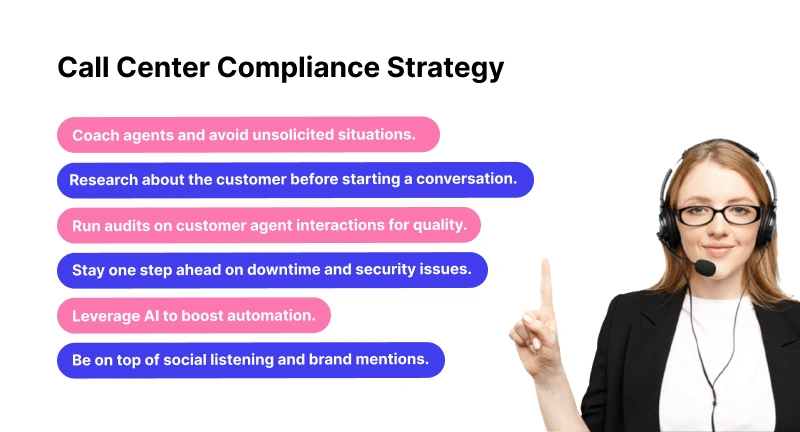Call center compliance isn’t just a box to check; it’s a critical pillar of a trustworthy, legally sound, and customer-first contact center. In a landscape governed by stringent data privacy laws, industry-specific regulations, and increasingly high customer expectations, staying compliant protects both your reputation and bottom line.
By adopting the right strategies, technologies, and processes, your call center can confidently stay compliant. This includes:
- Establishing a unified framework to manage evolving regulations like TCPA, HIPAA, GDPR, and CCPA
- Securing customer data with encryption, MFA, and data minimization
- Monitoring 100% of calls and interactions with automated auditing tools
- Providing ongoing compliance training and coaching for agents
- Balancing customer satisfaction with regulatory requirements using real-time agent assist.
Master call center compliance with Convin
What is Call Center Compliance?
Call center compliance refers to the adherence to legal, regulatory, and industry standards that govern how contact centers operate. These regulations include everything from data protection laws to telemarketing guidelines, ensuring that your contact center runs ethically and legally.
Compliance call meaning refers to a call that meets the required legal and regulatory standards. For instance, a compliance call is one in which customer consent is properly obtained, sensitive information is handled securely, and all interactions are documented accurately. Achieving call compliance requires thorough oversight of each customer interaction, something that can be quite challenging for large teams without the right tools.
For example, call centers that take payments over the phone must take steps at every possible stage to protect the customer's sensitive payment data, ensure that their identity is protected, and prevent fraud. This means that card details are kept confidential and handled safely.
Start investing in call center compliance standards today!
The Role of Compliance in Call Centers

The role of compliance in call centers cannot be overstated. It’s essential not only for legal reasons but also for maintaining a positive relationship with customers. Here’s why call center compliance is vital:
- Customer Protection: Call center compliance ensures that customers' personal data is protected, especially under laws like GDPR and HIPAA.
- Risk Mitigation: Non-compliance can lead to hefty fines, lawsuits, and even reputational damage.
- Operational Integrity: By maintaining call center compliance, contact centers can ensure their operations are transparent, ethical, and trustworthy.
Moreover, Convin’s conversation intelligence tools play a critical role in ensuring compliance. The platform’s ability to monitor agent performance, track call metrics, and provide real-time insights helps call centers stay on top of compliance while also improving agent performance.
This blog is just the start.
Unlock the power of Convin’s AI with a live demo.

Common Call Center Compliance Challenges & their Solutions
Call centers face several compliance challenges, especially when navigating diverse regulations across regions and industries. Managing these complexities while maintaining customer satisfaction requires the right tools and strategies.
1. Regulatory Complexity
- Operating across multiple regions or industries means adhering to different regulations like TCPA (USA) and GDPR (EU).
- Solution: Stay updated on evolving laws and create a unified compliance framework to streamline processes across regions. One of the best consent management platforms, like Usercentrics, can help you manage user consents while keeping your processes aligned with regulatory requirements.
2. Data Privacy Concerns
- Protecting sensitive customer data (e.g., under GDPR, HIPAA) is critical to avoid fines and reputation damage.
- Solution: Implement secure systems for data handling, encryption, and regular audits to ensure agents are trained on data protection practices.
3. Call Center Violations
- Violations can occur from improper consent or mishandling of customer information, often due to inconsistent monitoring.
- Solution: Regular compliance audits and clear documentation help ensure agents follow established protocols.
4. Balancing Customer Experience and Compliance
- Compliance procedures, such as legal disclaimers, can slow down conversations and negatively impact customer satisfaction.
- Solution: Use technology to integrate real-time compliance checks seamlessly, ensuring minimal disruption to the customer experience.
5. Lack of Consistent Monitoring and Audits
- Traditional manual auditing leaves gaps in compliance oversight.
- Solution: Implement automated systems for 100% monitoring and real-time audits to improve efficiency and reduce risks.
6. Employee Turnover and Training Challenges
- High turnover and the need to onboard new agents can complicate maintaining compliance standards.
- Solution: Regular, ongoing training, supported by automated performance monitoring, ensures agents are consistently updated on compliance requirements.
7. Keeping Up with Evolving Regulations
- Constant regulatory changes require call centers to remain agile, adapting their processes quickly.
- Solution: Establish a system to track legal updates and integrate them into your compliance process to ensure real-time adherence to new laws.
How Convin Helps
Convin streamlines call center compliance with AI-driven solutions. Key features include:
- Real-Time Monitoring: AI-powered compliance monitoring audits 100% of interactions across all channels, instantly flagging potential violations.
- Data Privacy Protection: Convin's platform transcribes and analyzes customer interactions to ensure compliance with data protection regulations like GDPR and HIPAA, preventing sensitive data breaches.
- Automated Audits: Convin’s AI-driven auditing tools ensure all calls are analyzed for compliance, offering real-time alerts and flagging violations for immediate action.
- Real-Time Agent Assist: Agents receive AI-powered prompts to stay compliant without disrupting customer interactions. This ensures all compliance requirements, such as consent, are met in real-time.
- Continuous Coaching: Convin provides personalized feedback and suggestions based on compliance criteria, ensuring agents improve consistently and stay aligned with regulatory requirements.
- Adaptation to Evolving Regulations: The platform automatically updates compliance protocols, ensuring that all conversations are aligned with the latest legal standards.
With Convin, call centers can navigate regulatory complexities more effectively, providing peace of mind that all compliance requirements are met seamlessly and in real-time.
What Are The Contact Center Compliance Regulations?
In the USA, customer interactions must adhere to various contact center compliance regulations:
- Telephone Consumer Protection Act (TCPA): Requires prior written consent for telemarketing calls and automated systems. AI tools offer real-time monitoring and analytics to ensure compliance with these regulations during outbound campaigns.
- Telemarketing Sales Rule (TSR): Sets rules on call times and specific information disclosure. Convin helps with this by offering real-time guidance to agents, ensuring they meet these compliance requirements during interactions.
- Do Not Call Registry: Businesses must avoid calling numbers on this list. AI tools like those offered by Convin help with identifying and filtering out non-compliant numbers in real-time.
- PCI-DSS: Ensures the security of customer payment card information. Convin emphasizes secure data handling practices, with features designed to support compliance during transactions.
- Fair Debt Collection Practices Act (FDCPA): Regulates debt collection calls. Competitors' solutions include compliance monitoring features that ensure calls adhere to these restrictions, preventing harassment.
- Consumer Financial Protection Bureau (CFPB): Oversee financial consumer protection laws. AI-powered platforms like Convin provide robust tools for ensuring compliance with these standards in financial conversations.
- California Consumer Privacy Act (CCPA): Protects consumer data rights. Convin supports compliance with CCPA by integrating privacy-centric features that ensure customer data is handled responsibly.
- HIPAA: Enforces secure handling of healthcare data. AI assistants now incorporate HIPAA-compliant frameworks, ensuring that call centers in healthcare sectors can meet privacy and security standards effectively.
These are some of the major contact centre compliance acts and regulations that should be followed in the USA. Any call center violations detected around them are punishable by law.
Call Center Compliance Checklist: Best Practices

Achieving compliance requires a multifaceted approach integrating technology, methods, and procedures. Below are key best practices for call center managers to ensure adherence to internal and external compliance requirements:
- Secure Your Network
- Implement network access control to limit unauthorized access to system hardware and software, especially for remote agents.
- Implement network access control to limit unauthorized access to system hardware and software, especially for remote agents.
- Perform Audits
- Conduct regular audits (both in-person and via video conferencing) to ensure agents' work environments meet compliance requirements.
- Conduct regular audits (both in-person and via video conferencing) to ensure agents' work environments meet compliance requirements.
- Authenticate Customers
- Use Single-Factor Authentication (SFA) for basic identity verification.
- Implement Multi-Factor Authentication (MFA) for enhanced security, especially for sensitive transactions.
- Use Single-Factor Authentication (SFA) for basic identity verification.
- Provide Mandatory Disclosures
- Ensure agents provide legal disclosures when recording calls, handling collections, or performing financial transactions.
- Ensure agents provide legal disclosures when recording calls, handling collections, or performing financial transactions.
- Adhere to TCPA Regulations
- Ensure agents comply with the Telephone Consumer Protection Act (TCPA) by providing required disclosures during telemarketing calls and following call restrictions.
- Ensure agents comply with the Telephone Consumer Protection Act (TCPA) by providing required disclosures during telemarketing calls and following call restrictions.
- Manage Sensitive Information
- Encrypt sensitive data, including PII, credit card numbers, and health information.
- Minimize the volume of stored data and use automation (e.g., IVR) for processing sensitive transactions.
- Encrypt sensitive data, including PII, credit card numbers, and health information.
- Offer Ongoing Training
- Provide regular compliance training for all agents to ensure they understand and follow necessary guidelines.
This checklist serves as a starting point to streamline compliance efforts and maintain the integrity of call center operations.
Try automated agent training for better call compliance.
Parting Words
Call center compliance is not optional, it’s a necessity for protecting both your business and your customers. While the challenges are significant—from navigating complex regulations and ensuring data privacy to managing agent training and turnover, they are far from insurmountable.
With the help of tools like Convin, call centers can automate compliance monitoring, track agent behavior in real-time, and receive alerts for violations instantly. The platform also ensures adherence through continuous coaching and updates its compliance logic as regulations evolve.
By implementing these best practices and using AI-powered compliance tools, your contact center can not only avoid costly penalties, but also build a reputation for trust, transparency, and operational excellence.
Reduce risks and enhance customer satisfaction
Frequently Asked Questions
1. What is compliance in a call center?
Compliance in a call center means following legal, regulatory, and industry standards (like GDPR, HIPAA, TCPA) to ensure ethical, secure, and lawful customer interactions.
2. What are the 5 steps to compliance?
- Identify regulations relevant to your industry.
- Assess risks and current gaps.
- Implement policies and secure systems.
- Train agents on compliance protocols.
- Monitor and audit regularly for adherence.
3. What are the three types of compliance?
- Regulatory Compliance – Following external laws and standards.
- Internal Compliance – Adhering to company policies and procedures.
- Contractual Compliance – Meeting obligations agreed upon with clients or vendors.
4. What are banking call center compliance?
Banking call center compliance includes strict adherence to laws like PCI-DSS, FDCPA, GLBA, and CCPA to protect financial data, ensure fair debt collection, prevent fraud, and safeguard customer privacy.
5. What is compliance role in BPO?
In the BPO (Business Process Outsourcing) industry, compliance ensures that the outsourcing organization meets all regulatory and contractual requirements. BPO compliance requirements encompass a wide range of aspects, including data privacy, data security, confidentiality, industry-specific regulations, and client-specific agreements.









.avif)